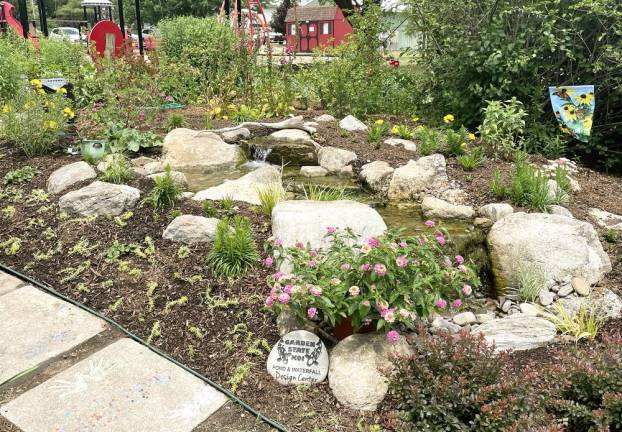Water feature for Butterfly Garden opens to the public
Pine Island. The Warwick Valley Gardeners celebrated the event with a ribbon cutting earlier this month.

The Warwick Valley Gardeners celebrated the grand opening of the Butterfly Garden and Habitat’s new water feature on June 10 at the Pine Island Park on Treasure Lane.
The Pine Island Butterfly Garden and Habitat’s new water feature was designed by Garden State Koi of Warwick. The original concept was developed by Mary Poler and other members of The Warwick Valley Gardeners with former Pine Island School Principal, Jane Hamburger. They were later joined by many individuals and organizations in an effort that began 12 years ago.
The Butterfly Garden is part of a network of 43,335 Monarch Waystation habitats registered with Monarch Watch, a volunteer-based citizen science organization that tracks the fall migration of the monarch butterfly. The waystations provide resources monarchs need to produce successive generations and sustain their migration. Without milkweeds throughout their spring and summer breeding areas in North America, the butterflies would not be able to produce the successive generations that migrate each fall. Without nectar from flowers, these fall migratory monarch butterflies would be unable to make their long journey to overwintering grounds in Mexico. The need for host plants for larvae and energy sources for adults applies to all monarch and butterfly populations around the world.
“The Monarch Waystation habitat is one in a series of oases scattered throughout the Hudson Valley and the United States that will help monarchs and other pollinators come back and survive better,” Warwick Valley Gardeners member Betsy Bowes said. “When Garden State Koi got involved their design greatly enhanced what we had imagined and the new water feature they installed is the result.”
Widespread adoption of herbicide-resistant corn and soybeans has resulted in the loss of more than 100 million acres of monarch habitat in recent years.
The planting of these crops – which are genetically modified to resist the herbicide glyphosate (Roundup) – allows growers to spray fields with this herbicide instead of tilling to control weeds.
Milkweeds survive tilling but not the repeated use of glyphosate. The habitat loss is substantial since these croplands represent a significant portion of the summer breeding area for monarch butterflies.
To learn more about the Warwick Valley Gardeners and its upcoming 2023 Garden Tour, log onto https://warwickgardeners.com/.